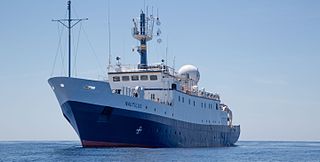Related Research Articles

French and Saunders is a British sketch comedy television series written by and starring comedy duo and namesake Dawn French and Jennifer Saunders that originally broadcast on BBC2 from 1987 to 1993, and later on BBC One until 2017. It is also the name by which the performers are known when they appear elsewhere as a double act. The show was given one of the highest budgets in BBC history to create detailed spoofs and satires of popular culture, movies, celebrities, and art. French and Saunders continued to film holiday specials for the BBC, and both have been individually successful starring in other shows.
A music video is a video that integrates a song or an album with imagery that is produced for promotional or musical artistic purposes. Modern music videos are primarily made and used as a music marketing device intended to promote the sale of music recordings. These videos are typically shown on music television and on streaming video sites like YouTube, or more rarely shown theatrically. They can be commercially issued on home video, either as video albums or video singles. The format has been described by various terms including "illustrated song", "filmed insert", "promotional (promo) film", "promotional clip", "promotional video", "song video", "song clip", "film clip", "video clip", or simply "video".

Captain Nemo is a character created by the French novelist Jules Verne (1828–1905). Nemo appears in two of Verne's science-fiction books, Twenty Thousand Leagues Under the Seas (1870) and The Mysterious Island (1875). He also makes a brief appearance in a play written by Verne with the collaboration of Adolphe d'Ennery, Journey Through the Impossible (1882).

Sissel Kyrkjebø, also simply known as Sissel, is a Norwegian soprano.
Stock footage, and similarly, archive footage, library pictures, and file footage is film or video footage that can be used again in other films. Stock footage is beneficial to filmmakers as it saves shooting new material. A single piece of stock footage is called a "stock shot" or a "library shot". Stock footage may have appeared in previous productions but may also be outtakes or footage shot for previous productions and not used. Examples of stock footage that might be utilized are moving images of cities and landmarks, wildlife in their natural environments, and historical footage. Suppliers of stock footage may be either rights managed or royalty-free. Many websites offer direct downloads of clips in various formats.

Rage is an all-night Australian music video program broadcast on ABC TV on Friday nights, Saturday mornings and Saturday nights. It was first screened on the weekend of Friday, 17 April 1987. With Soul Train and Video Hits no longer being produced, it is the oldest music television program currently still in production as of 2024. On Friday and Saturday nights, Rage typically starts between 11:00pm and 1:00am.

Russian rock music originated in the Soviet Union in the 1960s based on the influence of Western rock music and bard songs, and was developed by both amateur bands and official VIA.
A compilation film, or compilation movie is a film composed of scenes and shots taken from two or more prior films or television programs and edited together so as to make a new film, whether on the same or a different subject. The most common example would be a documentary film on an historical event composed of footage from various newsreels and other film documentaries on the same subject. New footage and/or a new soundtrack may also be included in a compilation film, but the compiled, older footage makes up the majority of its principal material. Compilation film does not include, however, a simple editing together of several short films, complete in themselves and distinguished as such from each others, which should be considered as film anthologies.
Video production is the process of producing video content for video. It is the equivalent of filmmaking, but with video recorded either as analog signals on videotape, digitally in video tape or as computer files stored on optical discs, hard drives, SSDs, magnetic tape or memory cards instead of film stock. There are three stages of video production: pre-production, production, and post-production. Pre-production involves all of the planning aspects of the video production process before filming begins. This includes scriptwriting, scheduling, logistics, and other administrative duties. Production is the phase of video production which captures the video content and involves filming the subject(s) of the video. Post-production is the action of selectively combining those video clips through video editing into a finished product that tells a story or communicates a message in either a live event setting, or after an event has occurred (post-production).

Titanic is a 1943 German propaganda film made during World War II in Berlin by Tobis Productions for UFA, depicting the catastrophic sinking of RMS Titanic in 1912. This was the third German language dramatization of the event, following a silent film released in 1912 just four months after the sinking and the British produced German film Atlantik released in 1929.
A soundtrack album is any album that incorporates music directly recorded from the soundtrack of a particular feature film or television show. The first such album to be commercially released was Walt Disney's Snow White and the Seven Dwarfs, the soundtrack to the film of the same name, in 1938. The first soundtrack album of a film's orchestral score was that for Alexander Korda's 1942 film Rudyard Kipling's Jungle Book, composed by Miklós Rózsa.

Mir was a class of two self-propelled deep-submergence vehicles. The project was initially developed by the USSR Academy of Sciences along with Lazurit Central Design Bureau, and two vehicles were ordered from Finland. The Mir-1 and Mir-2, delivered in 1987, were designed and built by the Finnish company Rauma-Repola's Oceanics subsidiary. The project was carried out under the supervision of constructors and engineers of the Shirshov Institute of Oceanology.

Loituma Girl is a Flash animation set to a scat singing section of the Finnish song "Ievan polkka," sung by the Finnish quartet Loituma on their 1995 debut album Things of Beauty. It appeared on the Internet in late April 2006 and quickly became popular. The animation consists of four frames showing the Bleach anime character Orihime Inoue twirling a leek, set to a 27-second loop from the song.
Esthetic Education is a rock band based in Kyiv, Ukraine. Its present members are Louis Franck (vocals), Dmytro Shurov (keyboards), Yuriy Khustochka (bass), Illya Halushko (guitars), and Andriy Nadolsky (drums). It was formed in 2004 after Shurov and Khustochka left the successful Ukrainian band Okean Elzy.

Sergey Vyacheslavovich Lazarev is a Russian singer. He is most famous for his singing career, when he rose to fame as a member of the group Smash!!. The group broke up in 2006. Since then Lazarev has pursued a solo career. He represented Russia in the Eurovision Song Contest 2016 in Stockholm, Sweden, and finished in third place, coming first in the televote. He represented Russia again at Eurovision Song Contest 2019 in Tel Aviv, Israel with the song "Scream", and similarly finished in third place.

Aleksei Oktyabrinovich Balabanov was a Russian film director, screenwriter, and producer, a member of European Film Academy. He started from creating mostly arthouse pictures and music videos but gained significant mainstream popularity in action crime drama movies Brother (1997) and Brother 2 (2000), both of which starred Sergei Bodrov, Jr. Later, Balabanov directed the films Cargo 200 (2007), Morphine (2008) and A Stoker (2010) which also received critical recognition.
"Daytona 500" is the second single by Wu-Tang Clan member Ghostface Killah, featuring Force MDs, Raekwon, and Cappadonna from his 1996 solo debut album Ironman. The title is taken from the most important and prestigious race on the NASCAR calendar: The Daytona 500. The song was later added to his greatest hits album, Shaolin's Finest.
Titanic was an ocean liner that struck an iceberg and sank in the North Atlantic Ocean in 1912.

EVNautilus is a 68-meter (223 ft) research vessel owned by the Ocean Exploration Trust under the direction of Robert Ballard, the researcher known for finding the wreck of the Titanic and the German battleship Bismarck. The vessel's home port is at the AltaSea facility in San Pedro in the Port of Los Angeles, California. Nautilus is equipped with a team of remotely operated vehicles (ROVs), Hercules, Argus, Little Hercules, and Atalanta, a multibeam mapping system, and mapping tools Diana and Echo, allowing it to conduct deep sea exploration of the ocean to a depth of 4,000 meters (13,000 ft).
"La Media Vuelta" is a song written and performed by Mexican singer José Alfredo Jiménez released in 1963. One of Jiménez' most famous compositions, the song has become part of the traditional Mexican musical repertoire, and has been recorded by dozens of singers and groups.
References
- ↑ Boris Kagarlitsky Restoration in Russia: Why Capitalism Failed 1859840728- 1995 - Page 159 "The most sought-after new release on the Russian rock music scene during 1994 was the album Titanic, recorded by the group Nautilus. The video clip of the same name also became one of the most popular on television. "